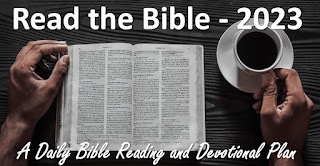"Choices Have Consequences" April 24 Readings: 1 Kings 12-14, 2 Chronicles 10-12
Reading the Bible Chronologically in 2022
This year, instead of reading from Genesis to Revelation, we will read the Bible as the story flows, as it happened and was written. There are several plans out there and I have worked to combine them into a plan that lets the Bible tell its own story "as it happened." Remember, the Bible is inspired, but not in the order the books appear in our Bibles. The Old Testament is approximately 3/4 of the Bible, but I have divided it so that we will spend half the year in the OT, and half the year in the NT.
Bible Readings: 1 Kings 12-14, 2 Chronicles 10-12
Background:
Solomon taught that life is choices and that those choices have consequences - the basis of the book of Proverbs. Then, his life spiraled downward as he made bad choices and, at least for a time, embraced folly. In today's reading, we see the consequences, in his son's life, of the folly he embraced.
Daily Devotional: Choices Have Consequences
The Bible makes it clear that each of us stands before God and accounts for our own sin, that we are not given grace because our parents are Christians nor are we held liable for our parent's sins. On the other hand, God revealed to Moses as he gave the Ten Commandments that the sins of the fathers would be visited on the children for generations to come. That is not a contradiction. We are not guilty for our parent's sins but we are affected by them.
That is precisely what happened to Rehoboam. Remember that the entire book of Proverbs was written to Solomon's sons to teach how to live and especially how to rule Israel. When Solomon said "my sons" over and over again, he had Rehoboam in mind. But the Solomon fell into sin and the example that he set negated the wisdom that he taught.
Jeroboam was just as much a failure as Rehoboam, though his failure took on a different form. He was confronted with a choice as well. Would he do what God said or would he follow his own reason and common sense? It seemed clear that if the people returned to Jerusalem to worship at the Temple they would be drawn back to unity eventually. But idolatry was forbidden. So he compromised. He never intended to lead Israel into idolatry, but he set up worship centers other than the Temple and he set up idols for the worship of Yahweh. All of this led Israel into two centuries of unbroken idolatry.
Rehoboam followed his own passions and pride instead of following the dictates of wisdom. Jeroboam followed his own reason instead of the revelation of God. Both led their nations astray because they did not obey God.
Obedience to God is often (always?) difficult but it is the path to blessing. Disobedience will make sense to us and will satisfy our passions, but it will always lead to destruction.
That is precisely what happened to Rehoboam. Remember that the entire book of Proverbs was written to Solomon's sons to teach how to live and especially how to rule Israel. When Solomon said "my sons" over and over again, he had Rehoboam in mind. But the Solomon fell into sin and the example that he set negated the wisdom that he taught.
Our children learn much more from our example than they do from our instruction.Life is choices and choices have consequences - you reap what you sow. That's what Proverbs is all about. And Rehoboam had a choice. He could listen to wise counselors and follow their wisdom or he could reject them, follow his own passions and do as he pleased. That is the root of folly - doing what you feel like doing instead of doing what God's word commands. When Rehoboam acted in folly, the nation split and for the next 200 years, there was both an Israel in the north and a Judah in the south.
Jeroboam was just as much a failure as Rehoboam, though his failure took on a different form. He was confronted with a choice as well. Would he do what God said or would he follow his own reason and common sense? It seemed clear that if the people returned to Jerusalem to worship at the Temple they would be drawn back to unity eventually. But idolatry was forbidden. So he compromised. He never intended to lead Israel into idolatry, but he set up worship centers other than the Temple and he set up idols for the worship of Yahweh. All of this led Israel into two centuries of unbroken idolatry.
Rehoboam followed his own passions and pride instead of following the dictates of wisdom. Jeroboam followed his own reason instead of the revelation of God. Both led their nations astray because they did not obey God.
Obedience to God is often (always?) difficult but it is the path to blessing. Disobedience will make sense to us and will satisfy our passions, but it will always lead to destruction.
Father, may I always listen to and obey your word, not the passions of my heart or the logic of my mind.
Consider God's Word:
Are you careful to walk in obedience to the word of God, or are you ruled by your own emotions or common sense?



Comments
Post a Comment